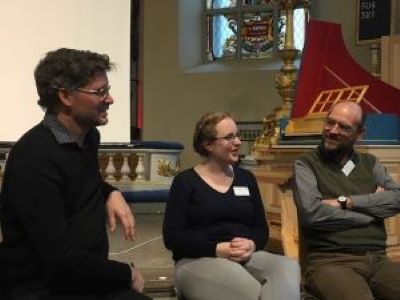Our PhD Horizons blog series continues with University of Edinburgh alumna, Eleanor Smith, who graduated with a PhD in Musical Instrument History in 2013. As well as her PhD, Eleanor also gained an MMus in Musical Instrument Research (2008) and BMus (2007).
Eleanor describes how she moved between academic and industry roles (and back again) all while using the skills and experience she gained through her PhD research:
My degrees in Music from the University are in a field where Edinburgh is world-leading in the study of musical instruments and their history (Organology). This is facilitated by the presence of important instrument collections, and the fantastic museum in St Cecilia’s Hall and Concert Room on the Cowgate. I spent many happy years working and studying in these collections and was able to combine my education as a musician with my interest in social history and cultural heritage. An element of my studies, and indeed my work for the museum, that I never considered would become such a prominent part of my future career path was my data management system: particularly working with excel and later database software to organise and analyse my research.
After taking a few years out of academia and working in the private sector, I am now living in Sweden and employed by the Gothenburg International Organ Academy. This is an independent arts organisation that works with organ performance, teaching, and research projects. My main role, as part of the Swedish Online Organ Archive (SONORA) project, is digitising and cataloguing a wealth of resources relating to historical Swedish organ building; working with the existing Organ database, and helping to cultivate new projects. I continue to develop ideas relating to my doctoral research, as well as bringing a different perspective to the current project.
When I was studying for my PhD, I was hyper-focussed on a particular path staying in research and teaching, even though there were perhaps more possibilities open for me in the libraries and collections route. I wish I had taken the time to explore my options a little more, to see what other opportunities might have been available, as even then the job market was unpredictable. I chose to continue down this route, taking on part-time teaching responsibilities at Edinburgh Napier University, and then taking up a Postdoc position working on a project based at the Orpheus Instituut for Artistic Research in Ghent, Belgium. I loved the teaching, and the research position allowed me to develop new areas of interest whilst also developing some of the elements of my doctoral research. However, by 2017, I had become a little disillusioned by the university/research job market and decided to seek work outside academia that would allow me to stay in Edinburgh instead as it had very much become my home.
I used my extensive skills and experience with data management to secure a position at Energy Research and Consultancy company, Wood Mackenzie, where I was an Application Operations Analyst supporting their databases and content management systems. I really enjoyed the chance to develop in a different direction and learn to work with much more complex systems than I had built for my own purposes. Wood Mackenzie also gave me opportunities to take courses within the company to advance and progress. It was a huge change for me after more than 10 years in academia, but I did thrive in this new environment. It was also so great to be using different skills, and still fed my love of gaining new knowledge.
It was in fact through a series of coincidences that I returned to academia: a contact in Gothenburg got funding to build an instrument which I had been involved with in the concept stage. Following a visit to the inaugural recital, I was invited to present my research at that year’s annual Organ Festival. I was able to attend this conference thanks to a Clutterbuck Scholarship grant from the Reid School and got the opportunity not only to present my own research, but also discuss project opportunities with my now-colleagues. Strangely enough, the skills I was able to build on at Wood Mackenzie (particularly in database management) were the perfect foundation for my current position!
The opportunities for Culture and the Arts seem to be much more stable here in Sweden, but I also feel less worried about the future – I now know that I have a wealth of transferable skills, and the option to study further here to find different opportunities.
Parting advice…
If there is one insight I would share from my experiences, it would not to be afraid to explore your options and grab opportunities when they come along. Sometimes the path is not as clear as you would like it to be, but it may lead to something totally new and unexpected.
Thanks Eleanor.
(Image caption: Eleanor Smith with Magnus Kjellson (left) and Walter Chinaglia (right) presenting at the Gothenburg International Organ Academy)
We’re delighted to be sharing more PhD Horizons alumni blogs throughout June – keep your eyes peeled on Inform.ed for more inspiring career journeys.
You can also get involved with PhD Horizons by viewing our website for details of webinars and much more.


